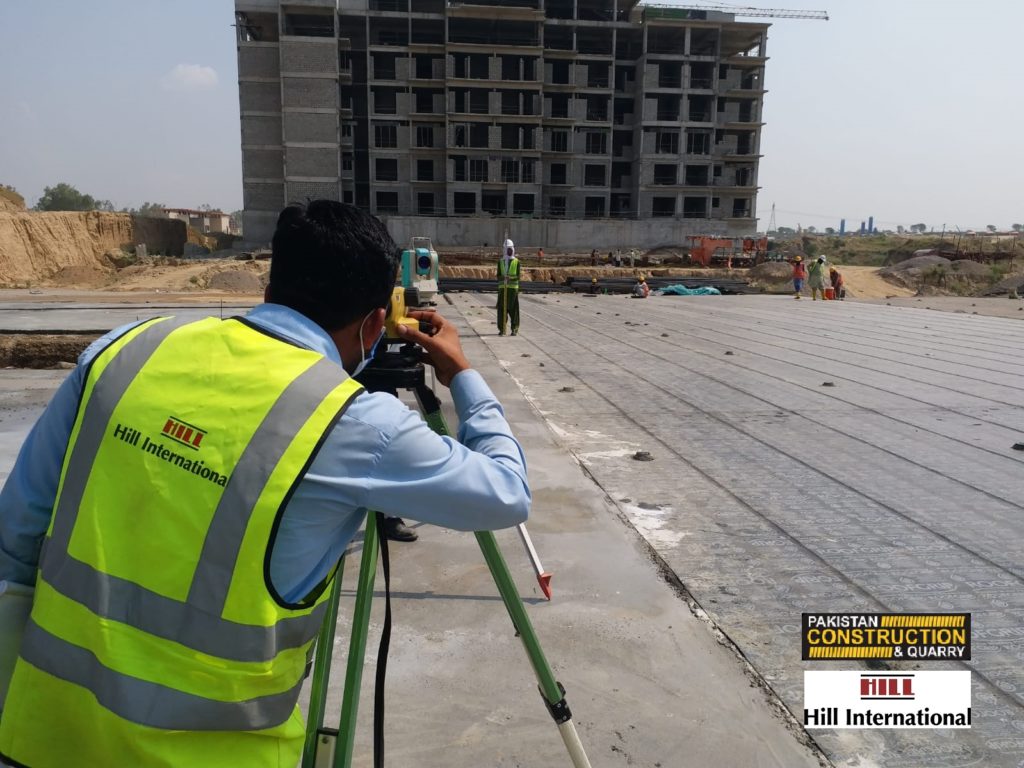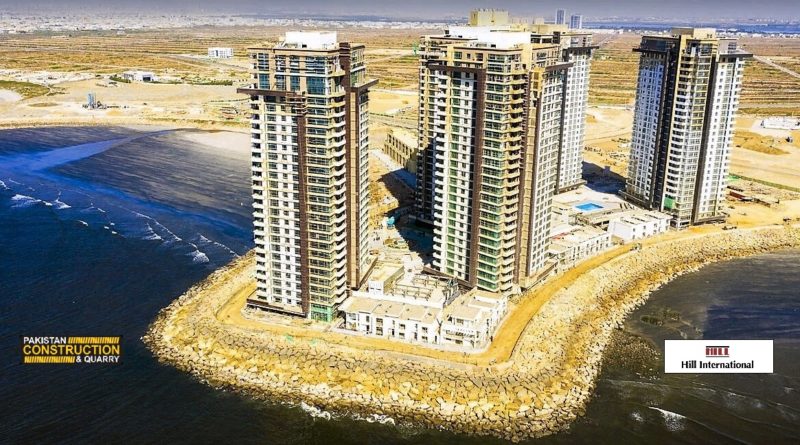Hill International sets sights on expanding Pakistan footprint
Hill International sets sights on expanding Pakistan footprint
Risk and reward determine the success of an investment in any geographical location. This is true in Pakistan, even as it awaits a silver bullet solution for its fast-growing demand for housing, schools, hospitals, and transportation facilities to support bulging urban areas and relentless efforts by the government to climb up the global economic ladder and increase standards of living for its citizens.
In its 2019 outlook, the United Nations estimated Pakistan’s population to be 220 million. This is striking, as the U.S. is currently home to some 328 million people and is 12 times larger than Pakistan. A closer look at the major urban areas of Islamabad, Karachi, Lahore, Peshawar, and Rawalpindi, to name a few, underlines how this booming population presages ample investment opportunities. Yet, the reality has so far been different as the risks and challenges of investing in Pakistan have outweighed rewards.
Pakistan’s federal government is well aware of the needs of its citizenry and in April 2020 unveiled changes that could potentially have wide-ranging impacts on the construction sector. In a major confidence-building measure – and one that may reduce risk and entice increased investments – Islamabad granted “industry status” to the Pakistani construction sector, in addition to rationalizing the existing tax regime and cutting into the red tape to spur investment. This new status confers upon the construction sector several incentives, including but not limited to:
- A fixed tax rate for the sector, with builders taxed per SF or SY.
- Waived withholding tax for the entire sector, except for steel and cement.
- Reduced sales tax at the provincial level.
- The establishment of a Construction Industry Development Board to support the sector.
Other incentives are more targeted, including reduced tax burdens for builders on specific urban housing projects and the elimination of capital gains taxes for home sellers.
This new status means construction activity is now a defined federal priority in Pakistan, said Syeda Fakhar Un Nisa, Hill International’s deputy country manager for Pakistan. With the government’s new measures and nomenclature, the expectation is investors will open the purse strings and “maybe, the first area where we will see new investments is in vertical construction [ high rises],” she said.
The government’s likely immediate focus will be the real estate sector, while international funding agencies will cater to planned infrastructure projects, Fakhar Un Nisa said, adding the bus rapid transit (BRT) corridor (known locally as Metro Bus) in Lahore was funded by the government. But a replication of the project in Peshawar received funding of $335 million from the Manila-based Asian Development Bank (ADB).
Under infrastructure, three metro projects are planned for Lahore, Karachi, and Peshawar, while several motorways and a revival of the circular rail in the port city of Karachi are also on the cards and will receive funding from the government and international agencies like the ADB and the World Bank, said Saqib Rana, another Hill International executive in Pakistan.
Rana notes that, in late October 2020, the first metro line went into service in the historical city of Lahore, signaling the country’s commitment to these projects.
Investments in Karachi are also strong, and many view the city as Pakistan’s most active civil construction market. Examples of development abound in the real estate and housing sectors, with Rana citing the 46,000-acre Bahria Town development in Karachi and the Defence Housing Authority Phase 9 project in Lahore as two major showcase projects.
Hill’s twin projects and PM solutions
U.S.-based Hill International has, however, had its footprints in the real estate sector in Pakistan since 2017 when it was awarded the Crescent Bay mixed-use development at a sea-front site about 20 km (12 miles) from the Karachi metropolis. The project is being built on reclaimed land and the layout of the plot, if viewed from a satellite, depicts three crescents, said Rana, who is the project’s coordinator.
Hill’s scope of works for Crescent Bay encompasses construction supervision services for five towers ranging from 28 to 42 storeys, in addition to related infrastructure facilities. Overall, the Crescent Bay project is planned to have a total of about 40 towers, townhouses, shops, gyms, pools, and spaces for recreational activities.
The five towers were due for completion in phases from February to October 2019. However, the Pakistani Rupee depreciation resulted in delays, as the devalued currency increased the price of imported items.

“Contractors were already on board when Hill took over the project, but there was a need for enhanced planning and greater coordination,” Rana said. As a solution, Hill introduced a proper protocol for employer instructions and ensured the contractor complied with all changes. Also, to overcome the dollar impact, alternate materials were proposed that could be procured locally, thus ensuring no major cost overruns.
With these remedial measures in place, Hill is targeting a revised completion date of March 2021 to hand over the Crescent Bay project to the client, Rana said.
Elite Islamabad, Pakistan prospects
In February 2020, Hill was appointed as a project supervision consultant for the Elite Reverie development in the capital of Islamabad. The scope of works for the project entails a more than 2 million SM mixed-use development that includes residential complexes with more than 2,000 villas and apartments, a retail and business park, a 20,152 square meter (SM) five-star hotel, a mall, medical and sports facilities, education villages, recreational facilities, and about 6,500 square meters (SM) of open space with an 18-hole golf course.
The project is about 10 km from the new Islamabad Airport and 15 km from the heart of downtown Islamabad, sited along the main Kashmir Highway. This enviable location is an added feature, making it a boutique investment and setting a new standard of urban living in Islamabad, said Haseeb Ali, Hill’s assistant resident engineer for Elite Reverie, also called Eighteen.
The project was named Eighteen after the ‘Eighteenth district’ of the twin cities of Rawalpindi and Islamabad, Ali said, noting specifically Hill’s current scope of works includes grey structure work for 168 villas; finishes work for 90 villas (Cluster-E); and grey structure work for residential building (Pavilion-4).
The biggest challenge Hill dealt with on Eighteen was the onset of the COVID-19 pandemic soon after it received its contract. This delayed staff mobilization, he said.
“Our full mobilization was possible in June and the project’s progress [until early November] is about 20% complete with the construction of grey structures for villas and residential buildings now carrying on in full swing,” Ali said.
“Our challenge on the site was to ensure the quality of work. As a project supervision consultant, we helped and guided the contractor and now the scenario has improved considerably,” Ali said, noting completion of the grey structures is now estimated for early 2021.
Despite the challenges, Pakistan’s government is expected to roll out additional construction projects worth Rs 400 billion ($2.4 billion) in 2021, while the country’s top builders are ready to execute projects valued at a total of Rs1.3 trillion ($7.87 billion), said Said Mneimne, senior vice president and managing director of Asia-Pacific for Hill International.
The Asian Infrastructure Investment Bank (AIIB) and the ADB have approved a $500 million loan to Pakistan, he said, providing key support for this additional construction activity.
Industry Growth
There is no denying that compared with other Asian nations Pakistan has miles to go to achieve its goals for its civil construction industry. While the federal government has done its part by granting a new status to the construction sector, major industry players must also be willing to accept established management best practices.
The consultant-contractor relationship in Pakistan, for example, is one of the

tuggers of war and there is ample room for minimizing distrust and joining hands, said Fakhar Un Nisa.
“Planning is a significant part of any project and contractors often give an estimated completion date that they then find a Herculean task to maintain. They don’t put all relevant information on the table, and this leads to labor issues and delays in the delivery of materials, resulting in the overall project going over budget and experiencing delays,” she said. For its part, Hill International has several solutions in its toolbox to minimize owner risk and ensure tighter project controls.
Looking ahead, with a total of about 45 staffers assigned to its national projects, Hill is developing a critical mass in Pakistan’s real estate sector while simultaneously setting its sights on major planned infrastructure projects like the metro lines, BRT corridor, and airport improvements, Fakhar Un Nisa pointed out.
Hill will continue to pursue opportunities with international developers like Emaar and local developers such as the Elegant Town and City Homes for the Knowledge City in Punjab and the UBL Bank in Karachi, as well as the development of the Al Ghaba airport in Rahim Yar Khan by the UAE Presidential Affairs, Mneimne said.
“Pakistan represents an opportunity for significant growth,” Mneimne concludes. “The government’s attention to the construction sector, combined with the demographic realities of the population, means that urban development simply must occur. Our plan at Hill is to help realize this growth, both in terms of horizontal and infrastructure projects, as efficiently as possible for our clients.”

